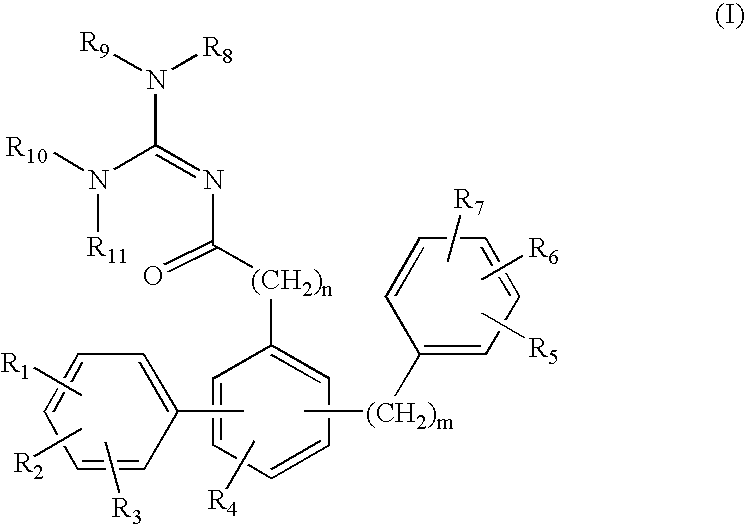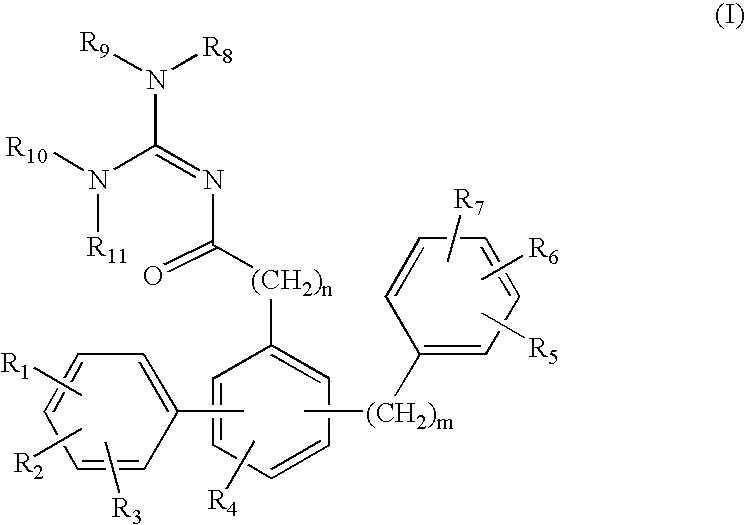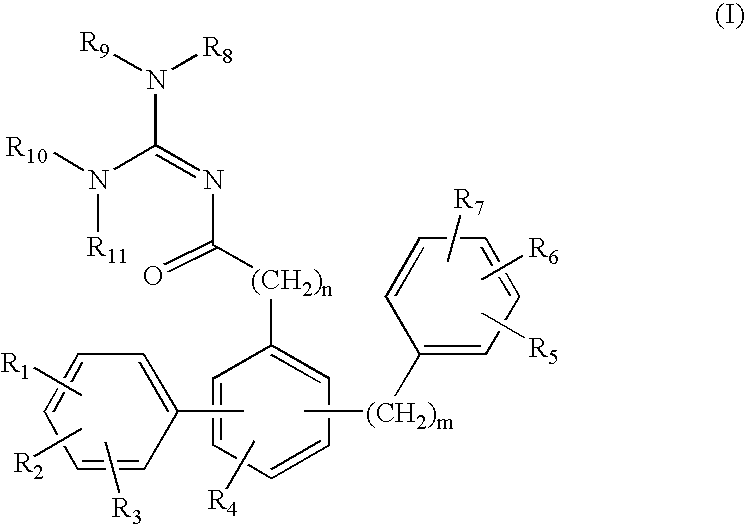Terphenyl guanidines as beta-secretase inhibitors
a beta-secretase inhibitor and terphenyl guanidine technology, applied in the field of0002amyloid deposits and neurofibrillary tangles, can solve the problems of eventual death and severe impairmen
- Summary
- Abstract
- Description
- Claims
- Application Information
AI Technical Summary
Benefits of technology
Problems solved by technology
Method used
Image
Examples
example 1
Preparation of N-(1,1′:3′,1″-Terphenyl-2′-ylacetyl)guanidine TFA salt
[0091]Step 1
[0092]A mixture of 2′-bromomethyl-[1,1′:3′,1″]terphenyl (Tetrahedron Lett. 42; 5467-5472 (2001)) (1.65 g, 5.1 mmol) and sodium cyanide (0.27 g, 5.6 mmol) in 10 mL of DMF was stirred at room temperature overnight. The reaction mixture was poured into water, extracted with diethyl ether and dried over magnesium sulfate. The solvent was removed and the residue was purified by silica gel chromatography (eluting with 0-4% ethyl acetate in hexane) to give [1,1′;3′,1″]terphenyl-2′-yl-acetonitrile as a white solid (0.78 g, 57%): MS (ESI) m / z 270.1 (M+H); HRMS calcd for C20H15N, 270.1277. Found (ESI+): 270.1274; 1H NMR (DMSO-d6): δ 3.57 (s, 2H), 7.20-7.50 (m, 13H).
[0093]Step 2
[0094]A mixture of [1,1′;3′,1″]terphenyl-2′-yl-acetonitrile (0.78 g, 2.9 mmol) in 28 mL of 10:3:1 acetic acid / sulfuric acid / water was refluxed for 2 days The reaction mixture was cooled and diluted with water. The aqueous was extracted with...
example 2
Preparation of N-{[3-(2-Naphthyl)-1,1′-biphenyl-2-yl]acetyl}guanidine
[0097]Step 1
[0098]To a mixture of potassium phosphate (8.36 g 40 mmol), palladium acetate (0.88 g, 0.4 mmol), 2-(dicyclohexylphosphino)biphenyl (0.54 g, 1.6 mmol) and nphthalene-2-boronic acid (5.09 g, 30 mmol) was added 3-cloro-2-methyl-biphenyl (4.0 g, 20 mmol). The reaction mixture was heated to 80° C. overnight, diluted with diethyl ether, washed with water and dried over MgSO4. Removal of solvent under reduced pressure gave a crude product that was purified by silica gel chromatography eluting with hexanes gave 2-(2-methyl-1,1′-biphenyl-3-yl)naphthalene as a white solid; mp 106-107° C.; MS (EI) m / z 294.17 (M+); 1H NMR (CDCl3): δ 2.15 (s, 3H), 7.20-7.55 (m, 11H), 7.75-7.90 (m, 4H); Anal. Calcd for C23H18: C, 93.84; H, 6.16. Found: C, 93.81; H, 5.95.
[0099]Step 2
[0100]A solution of 2-(2-methyl-1,1′-biphenyl-3-yl)naphthalene (2.0 g, 6.8 mmol) and 200 mg of benzoyl peroxide was refluxed, then NBS (1.21 g, 6.8 mmol)...
example 3
Preparation of N-[(4-tert-Butyl-1,1′:3′,1″-terphenyl-2′-yl)acetyl]guanidine
[0105]Step 1
[0106]Using essentially the same procedures described in Example 2 Steps 1 to 3 and employing 3-cloro-2-methyl-biphenyl and 4-tert-butylbenzene boronic acid, 4-tert-butyl-[1,1′;3′, 1″]terphenyl-2′-yl)-acetic acid was prepared, MS (ESI) m / z 343.3 (M−H); 1H NMR (DMSO-d6): δ 1.32 (s, 9H), 3.34 (s, 2H), 7.15-7.45 (m, 12H), 12.08 (brs, 1H); HRMS calcd for C24H24O2: 345.1849. Found (ESI+), 345.1847.
[0107]Step 2
[0108]Using essentially the same procedure described in Example 1 Step 3 and employing 4-tert-butyl-[1,1′;3′,1″]terphenyl-2′-yl)-acetic acid, the title compound was prepared and isolated as a white solid; mp 171-174° C.; MS (ESI) m / z 386.3 (M+H); 1H NMR (DMSO-d6): δ 1.31 (s, 9H), 3.62 (s, 2H), 7.20-7.50 (m, 12H), 8.10 (brs, 3H), 11.12 (s, 1H); HRMS calcd for C25H27N3O 386.2229. Found (ESI+): 386.2223.
PUM
| Property | Measurement | Unit |
|---|---|---|
| volume | aaaaa | aaaaa |
| structure | aaaaa | aaaaa |
| composition | aaaaa | aaaaa |
Abstract
Description
Claims
Application Information
 Login to View More
Login to View More - R&D
- Intellectual Property
- Life Sciences
- Materials
- Tech Scout
- Unparalleled Data Quality
- Higher Quality Content
- 60% Fewer Hallucinations
Browse by: Latest US Patents, China's latest patents, Technical Efficacy Thesaurus, Application Domain, Technology Topic, Popular Technical Reports.
© 2025 PatSnap. All rights reserved.Legal|Privacy policy|Modern Slavery Act Transparency Statement|Sitemap|About US| Contact US: help@patsnap.com



